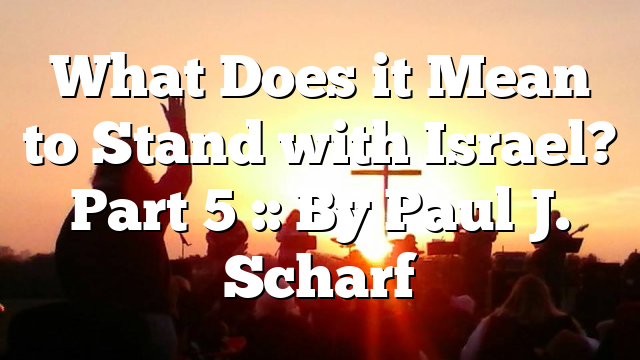While Israel faces the increasing potential of an expanding war in the Middle East, the world is clearly careening into a new era of unreserved antisemitism.
How should we as Christians respond?
If we are convinced Biblically that God still has a future for the people, nation, and land of Israel—that He will fulfill every promise He has ever given His chosen people and every prophecy He has ever made about them—that will certainly determine the tenor of our reaction.
The question confronting us is, will we indeed stand with Israel in her hour of need? The attendant question that I have been exploring here is, what does it really mean to stand with Israel?
In the previous installments in this series, I have posited that to stand with Israel means, in Biblical terminology, to desire to be a blessing to the people of Abraham, Isaac and Jacob.
What makes the people of Israel qualified to receive such blessing? It is certainly not any intrinsic goodness within them (see Deut. 7:6-8). Instead, it is based on the unconditional covenant that God first made with Abram in Gen. 12:1-3. That covenant promises a physical home, an “innumerable” (Heb. 11:12) number of posterity and extraordinary blessings. He followed with this promise, which establishes the parameters by which the world must forever function with regard to Abram and his line:
“I will bless those who bless you,
And I will curse him who curses you” (Gen. 12:3).
Throughout the Hebrew Scriptures, the Lord continually repeats this covenant to Abram and those promised descendants. He even reminds us of its importance in the New Testament (see especially Gal. 3:8-16).
The Abrahamic Covenant is also the basis of the remaining three unconditional covenants, each of which expands on one of its original provisions. The land clause is taken up in the Land Covenant (see Deut. 29:1-30:10); the seed clause is developed in the Davidic Covenant (see 2 Sam. 7:1-17); and the blessing clause is further explained in the New Covenant (see Jer. 31:31-34).
Often, the Old Testament describes this “great nation” that God promised Abram in the singular, as the Apostle Paul did also in Gal. 3:16, when he stresses a point about the “Seed.” The Hebrew text reads likewise in verses such as Gen. 12:7, 13:15, 15:18, 22:18, 24:7, 26:4, 28:14, 48:4; Ex. 33:1; and Deut. 34:4. Of course, these are clearly references to Jesus, the Messiah.
Yet, we understand that this cannot invalidate the expectation of the entire nation of inheriting and enjoying the land; otherwise, there would be no point in holding out the hope that is expressed in such passages as Gen. 48:4:
“Behold, I will make you fruitful and multiply you, and I will make of you a multitude of people, and give this land to your descendants after you as an everlasting possession.”
In this verse also, “descendants” is singular in Hebrew. Yet, in the context, it becomes clear that “a multitude of people” would actually inhabit the land. Indeed, the whole “nation” (Gen. 12:2) is entrusted with the care of the land until the Messiah comes to rule over it.
So, where does that leave Israel today?
I wrote last time about the opportunity that my wife and I had to attend the “Faces of October 7th” event in the Milwaukee area earlier this month. We heard from two survivors of Kibbutz Be’eri, which was the first place to be struck by Hamas as it unleashed terror on the people and nation of Israel.
A person would have to be very jaded to listen to such a presentation and not be moved to sympathy—and determination—on behalf of those who suffered so horribly. For a host of reasons, the United States of America still officially affirms an alliance with Israel—and many of us are supportive of that legacy in our country, and grateful. We want Israel to be at peace, dwelling safely in the land that God promised to Abram.
But, can we make a case Biblically that Israel today has a right to possess and defend that same land? That is certainly an important question, and I will attempt to deal with it succinctly in another article—the final installment in this series.
***
Paul J. Scharf (M.A., M.Div., Faith Baptist Theological Seminary) is a church ministries representative for The Friends of Israel Gospel Ministry, based in Columbus, WI, and serving in the Midwest. For more information on his ministry, visit sermonaudio.com/pscharf or foi.org/scharf, or email [email protected].
Scripture taken from the New King James Version.
The post What Does it Mean to Stand with Israel? Part 5 :: By Paul J. Scharf appeared first on Rapture Ready.

Leave a Reply